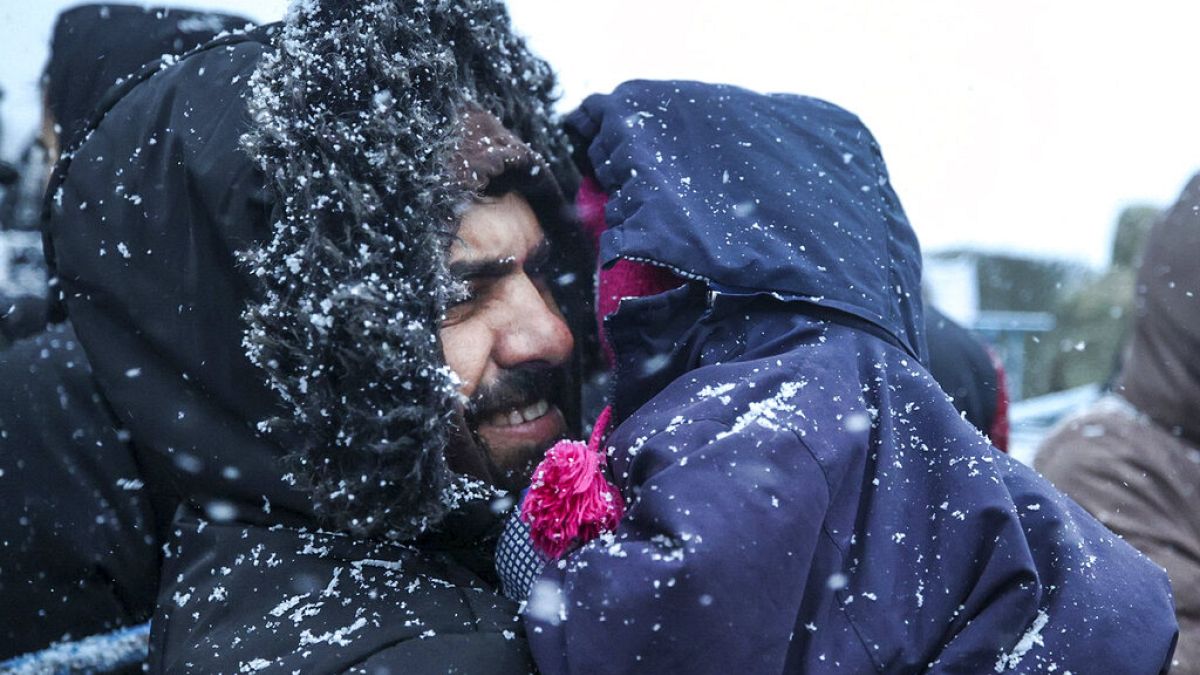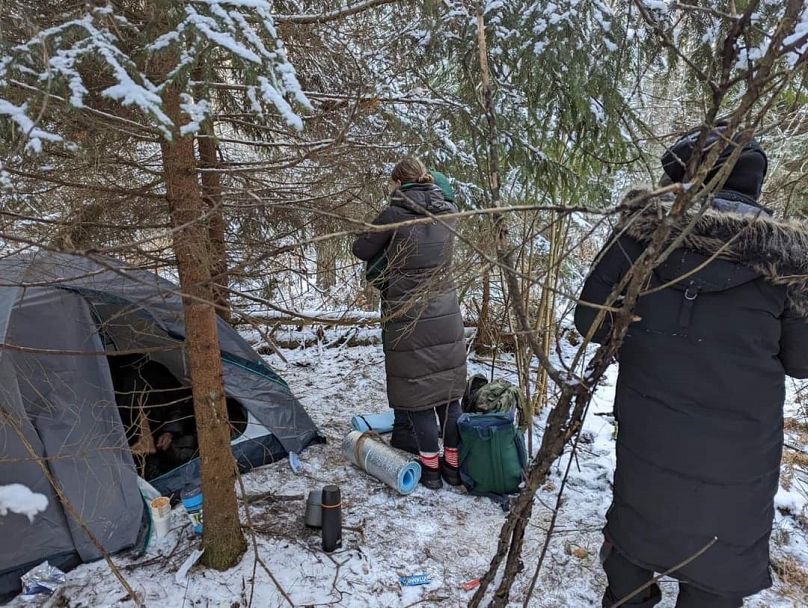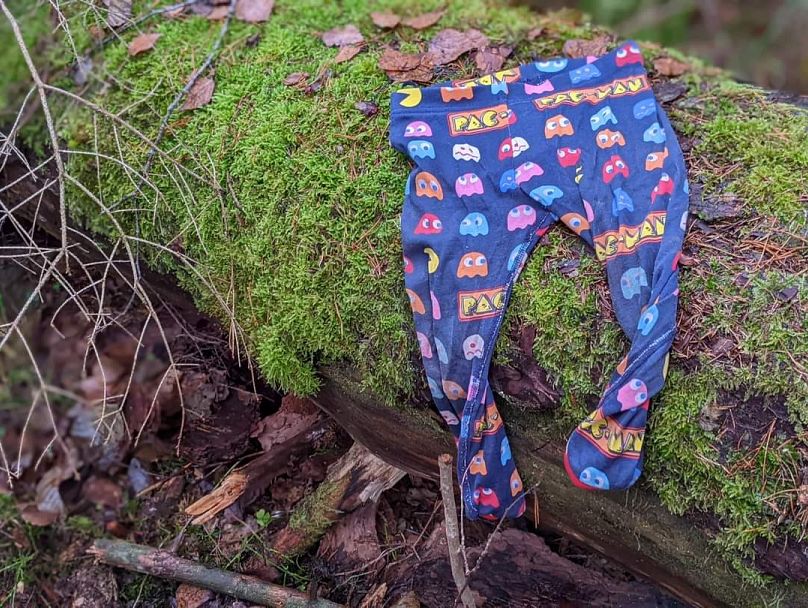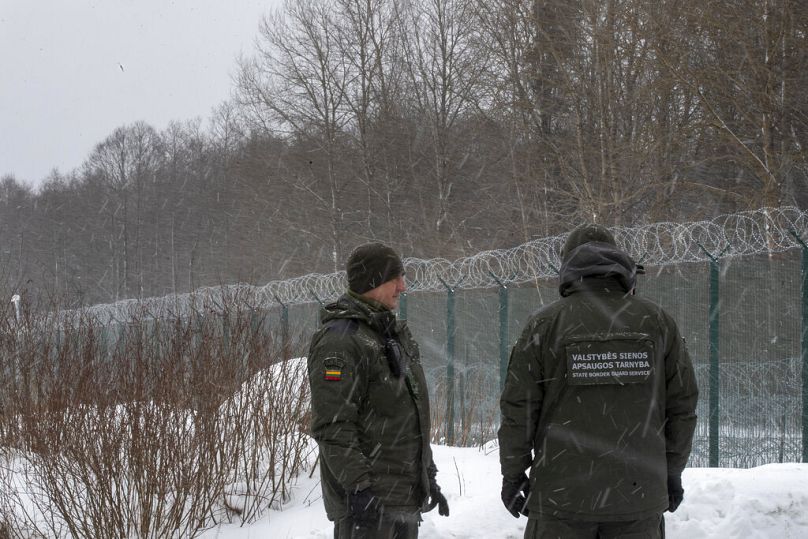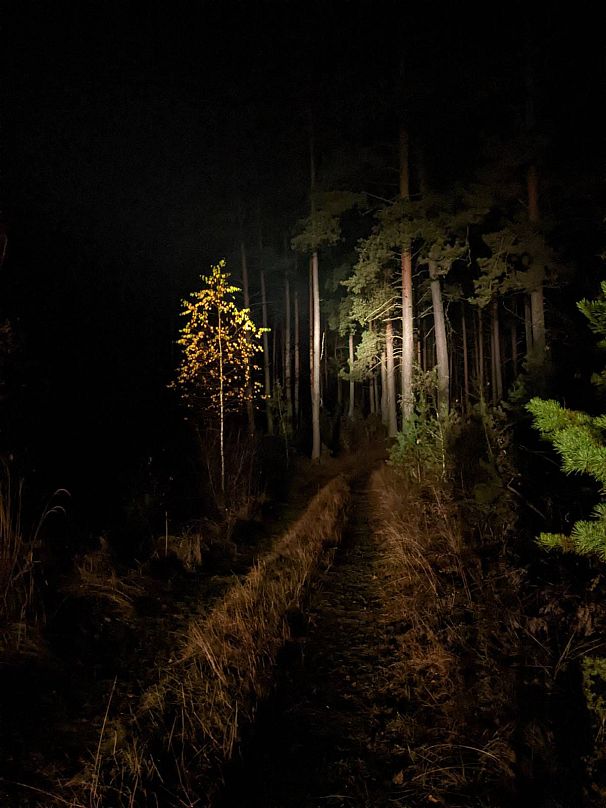At least three migrants have had their legs amputated in recent months after trying to cross the Lithuanian-Belarus border.
Angel* was promised a European education.
He ended up losing his leg and is now stuck in a foreign land -- far from his friends and family.
Facing ethnic strife and grinding poverty in his native Sri Lanka, the 20-year-old was lured to Belarus by an advert for an international studies programme, offering a trip to Paris.
It turned out to be fake – a trap laid by Belarus’s government, he claims – and the promise of a European visa was actually climbing through a hole in the Lithuania border fence under the moonlight.
Dressed only in a summer jacket and cotton shoes, Angel and a few others wandered for days and nights in the wooded border area, buffeted by icy winds and freezing temperatures.
He eventually made it to Vilnius airport but was detained by Lithuanian border guards, who found his leg riddled with infection, having succumbed to frostbite during the journey.
It was amputated in hospital days later.
Angel is just one of the victims of Europe’s forgotten migration crisis, which is currently taking place on the region's eastern fringe.
At least three migrants have lost their legs to frostbite in recent months, with many more suffering debilitating injuries to their hands and feet that will be with them forever.
What is causing the border crisis?
A lot of finger-pointing is going on over what’s behind the crisis.
Authorities in Lithuania – as well as the EU – place the blame squarely on the shoulders of Belarus, claiming it has weaponised migrants in retaliation for sanctions slapped on Minsk by the bloc in 2020.
“The Belarusian regime is the organiser of this ongoing irregular migration crisis,” Lithuania's interior ministry said in a statement sent to Euronews.
“Migrants are being used as a tool to create chaos, not only in our own country or in neighbouring countries, but throughout the European Union.”
The ministry claimed Belarus is using migration as a “form of hybrid aggression” against Lithuania, which has pushed nearly 11,000 people back across the borders so far this year.
Belarussian officials have been accused of cutting holes in Lithuania’s sprawling razor-wire fence and pushing large groups of migrants through, as well as guiding them to weak spots.
Last month, Lithuanian interior minister Agne Bilotaitė claimed Belarus was sending migrants across the border barefoot and without proper winter clothing in an attempt to ramp up pressure on the Baltic country. She maintained this would not be grounds to be granted entry into Lithuania.
But Vilnius has not escaped scrutiny.
Lithuanian border guards have been repeatedly accused of violently pushing migrants back into Belarus, and worse.
During his time in the border area, Angel claims he encountered Lithuanian officials who sent him away without clothing or any kind of assistance, despite their perilous position.
Other reports suggest that even when migrants receive medical assistance in Lithuania they are routinely taken back to Belarus afterwards.
Officials deny this.
“Lithuanian border guards always organise emergency medical assistance to irregular border crossers when needed,” wrote the interior ministry in its statement. “Foreigners are also given a humanitarian package containing the necessary equipment, dry rations and water, as well as winter footwear and clothing”.
“If the situation is really serious, the border guards call an ambulance,” it added.
‘Ping-pong pushbacks’
Claiming it is under attack, Lithuania's government has adopted a pushback policy, where migrants are prevented from entering the country or immediately expelled if they managed to break through.
This has given rise to a phenomenon known as ping-pong pushbacks, where migrants are batted back and forth across the two country’s borders over and over again, at times within the same night.
Many experts have pointed out that this is illegal.
“This official policy of the government is definitely not in compliance with international human rights or refugee law," Mėta Adutavičiūtė, head of advocacy at Lithuania's Human Rights Monitoring Institute, told Euronews.
Under the EU Charter of Fundamental Rights, those arriving in a country have a right to claim asylum, with the country’s authorities then deciding on whether to give them protection or not.
Lithuania, an EU member state, is a signatory of this treaty.
"Even if it's the case [that Belarus is] instrumentalising migration, we still need to look at the human rights aspect and still uphold our international obligations," continued Adutavičiūtė.
"People should at least be given the chance to apply for asylum and have their applications duly considered," she claimed.
Lithuanian officials claim the exceptional situation on their borders, allows them to temporarily suspend certain legal protections.
Viewing migrants on Lithuania’s borders as a weapon is having a much wider effect on society.
“When the government says the country is under hybrid attack by the Belarussian regime it turns the people who are trying to cross the borders into a threat,” says Adutavičiūtė, adding that this "securitisation" prevents society from looking at the situation in the border as a "humanitarian issue".
Negative attitudes towards refugees and migrants -- bar those from Ukraine -- have grown in Lithuania in recent years, with increasing numbers of Lithuanians associating them with criminality.
‘Big humanitarian issue'
Meanwhile, men, women and children find themselves trapped in a brutal no man’s land, often in dire humanitarian need.
"Pushbacks result in human tragedies, especially in such harsh weather conditions," Adutavičiūtė told Euronews. "Even if it's a response to Belarus's weaponisation of migrants, they put people's lives in danger."
"When people are stuck in the forest, they need to decide whether to light the fire and warm themselves up and be spotted ... or stay in the freezing cold. It's definitely a huge humanitarian issue.
“This cannot continue," she added.
Adutavičiūtė claims that pushbacks are driven by a broader deterrence strategy, the idea that if conditions are made worse enough, and the border crossing made hard enough, people will not make the perilous journey.
But this assumes migrants voluntarily migrate.
“People flee for all kinds of reasons, but usually because they can't stay. People are coming from Syria, Afghanistan, Yemen, Eritrea and so on."
The three have been blighted by conflict and political instability in recent years, while Eritrea struggles with chronic issues around food, work and a repressive government, which often forces people into open-ended conscription in the military.
Many migrants also say there is a lack of legal routes to enter the EU, with many forms of visa prohibitively expensive, heavily oversubscribed or non-existent.
Where does responsibility lie for the situation on the Lithuania-Belarus border?
Though there are some who are extending a helping hand.
A group of volunteers – known as Sienos Grupė -- provide humanitarian aid to people stuck in the border zone, staying awake through the night so they respond to any distress calls and bring food, warm clothes, sleeping bags, chargers or whatever migrants may need.
"We as simple volunteers, normal people, we felt from the heart that it is necessary to act," said Lina Žemaitytė, a volunteer at the organisation.
Other EU member states and the bloc itself are involved, too.
"Of course, support in terms of both human resources and technical assistance has been received from many countries and organisations," said Andrius Jarackas, a spokesman for Lithuania's State Border Guard Service, with joint operations coordinated by Frontex, the European Border and Coast Guard Agency.
He also said that Estonia, Poland and Austria had given "technical support" to Lithuania on a bilateral basis, while "most EU member states "provided support to ensure adequate accommodation conditions for the irregular migrants."
In June, Amnesty International released a report claiming that thousands of people have been arbitrarily detained in militarised centres, where they were subjected to inhumane conditions, torture and other ill-treatment.
Other experts claim that the responsibility of the EU for this crisis runs much deeper.
Most migrants – like Angel – wanted to go to northern European states, like France or Germany, with Lithuania being just a stop-gap.
"Responsibility lies first of all with Belarus and, at the same time, with the governments of border countries in how they respond,” said Adutavičiūtė. "However, there might have been some solutions, like perhaps sharing the burden [across the EU] with a quota system."
"There should be much more effort on the part of the EU to convince the governments of the border states to reconsider their response, taking into account humanitarian and human rights issues.
"Even in times of emergency," she added.
* Angel's name has been changed to protect his identity.
